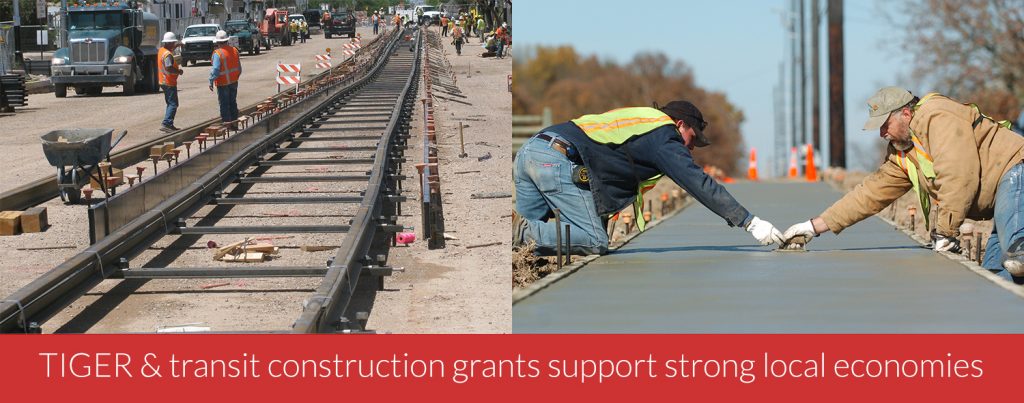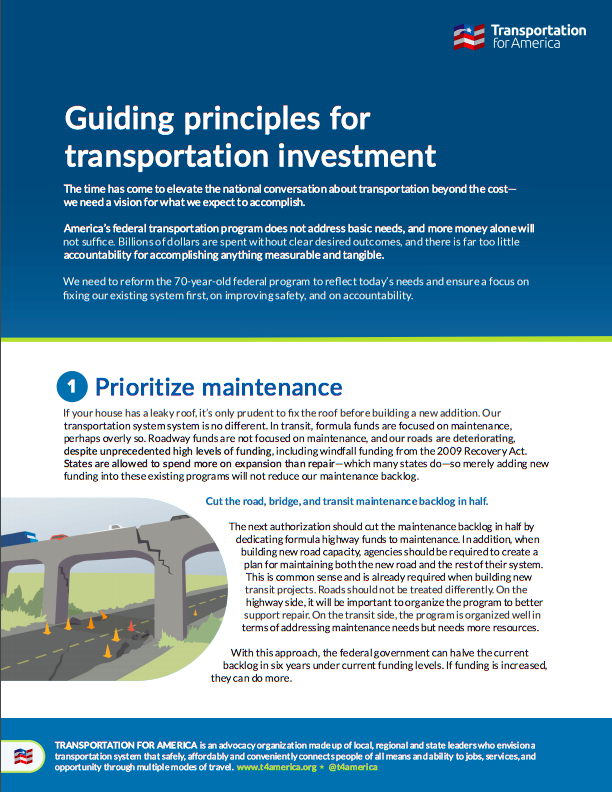162 organizations and local business and elected leaders from 30 states urge Congress to support TIGER & public transit funding
162 organizations, including elected state/local officials and chambers of commerce, sent a letter to House and Senate appropriators today urging Congress to continue investing in smart projects to move goods, move people and support the local economies that our nation’s prosperity is built on.

The letter, signed by 19 local elected officials, 9 state legislators, 9 chambers of commerce and over 120 other organizations, urges those currently assembling the federal transportation budget for the rest of 2017 and 2018 to prioritize funding for both TIGER competitive grants and Transit Capital Investment Grants — programs that have been targeted for outright elimination in President Trump’s budget requests for 2017 and beyond.
The majority of all federal transportation dollars are awarded to states and metro areas by relatively simple formulas that ensure everyone gets a share, regardless of how they’re going to spend those dollars or how well-conceived their projects are. Yet, through the TIGER grant program, the federal government has found a smart way to use a small amount of money (about $500 million annually since 2009) to incentivize the best projects possible. This fiercely competitive program is one of the few ways that local communities of almost any size can directly receive federal dollars for their priority transportation projects. Projects vying for funding compete against each other on their merits to ensure that each dollar is spent in the most effective way possible and through the first seven rounds, each TIGER dollar has brought 3.5 non-federal dollars to the table.
The Transit Capital Investment Grants program supports metro areas of all sizes investing their own money in building or expanding transit service. While making the case for eliminating the program, the Trump Administration recently stated that “localities should fund these localized projects,” but local voters and leaders are doing that already, putting their own skin in the game to meet the growing demand for well-connected locations served by transit. At the ballot box last November alone, voters approved more than $200 billion dollars in tax increases to invest in these projects. But they’re counting on the federal government to continue supporting these bottom-up efforts, as they’ve done for decades.
Indianapolis, Albuquerque, Atlanta, Seattle, Kansas City, Minneapolis and a plethora of other towns and cities have already raised their own money to invest in building new transit service. Eliminating this program will threaten their economic prospects and their ability to satisfy the booming demand from residents and employers alike for well-connected locations served by transit.
Here’s the full text of the letter:
Dear Chairmen Cochran, Frelinghuysen, Collins, and Diaz-Balart and Ranking Members Leahy, Lowey, Reed, and Price:
As you prepare the omnibus Fiscal Year (FY) 2017 appropriations bill and the Transportation-HUD appropriations bill for FY2018, we write to respectfully request that you fund the Transportation Investment Generating Economic Recovery (TIGER) program at or above FY16 level of $500 million and that you fully fund the Transit Capital Investment Grants program at the FAST Act authorization level of $2.3 billion.
Local and regional governments generate nearly three quarters of U.S. gross domestic product, represent two- thirds of the nation’s population, and account for 95 percent of all public transportation passenger miles traveled. Yet, our local jurisdictions receive less than 10% of the federal highway program’s funding.
The incredibly popular TIGER grant program is one of the only ways that local communities can apply for and secure funds from the federal government for priority transportation projects. The TIGER competition spurs innovation, leverages federal funding far greater than what’s available through formula programs, and awards funding to projects that provide a high-return on investment.
Year after year, the demand for TIGER far exceeds the amount of funding available. In 2015, the U.S. Department of Transportation (USDOT) received 627 applications requesting more than $10.1 billion in funding, which was 20 times the amount available. Since its creation in 2009, TIGER has made critical investments in multimodal projects in every state in the nation, the District of Columbia, and Puerto Rico.
Likewise, the transit Capital Investment Grants program (i.e. New Starts, Small Starts, Core Capacity) is the federal government’s primary resource for supporting locally-planned, major transit capital investments. The program has facilitated the creation of new or extended public transportation systems across the country.
Under this program, FTA awards grants on a competitive basis for large projects that cannot traditionally be funded from a transit agency’s annual formula funds, such as new fixed guideway systems, including heavy rail (subway), light rail, streetcars, or bus rapid transit. Projects are encouraged to leverage public-private-partnerships (P3) to participate in a streamlined grant process. Recognizing the importance of this program, Congress increased its authorization by $400 million in the FAST Act.
Both the TIGER and Capital Investment Grants programs complement DOT’s traditional formula-based programs. Both programs provide unique, cost-effective, and innovative solutions that leverage private, state, and local investment to solve complex transportation opportunities and spur economic development.
While we are writing today about the TIGER and CIG programs in particular, we also want to make clear that these programs should not be paid for by significant cuts in other essential discretionary domestic programs. The Trump administration’s budget proposal falls short in prioritizing investment in the local communities that are the basic building block of our national economy. We urge Congress to uphold its promise to the American people and reinvest in our nation’s communities.
Thank you for considering these critical programs, which invest in our nation’s infrastructure, create jobs for American workers, and boost our regional economies.
Sincerely,
See the full letter (pdf) for the full list of organizations and officials that signed the letter.






Pingback: Is Portland Losing Its Resolve Against Highway Expansions? – Streetsblog USA